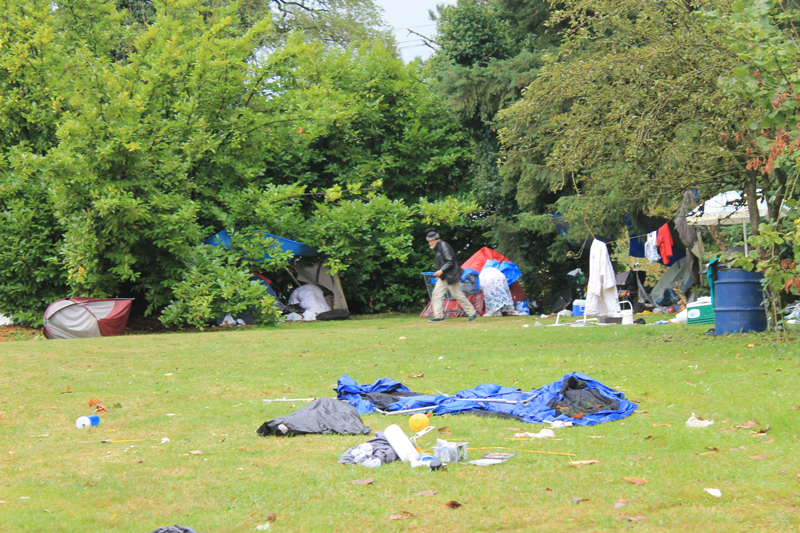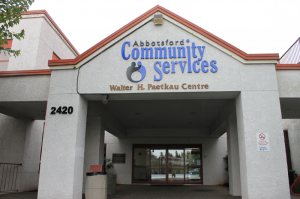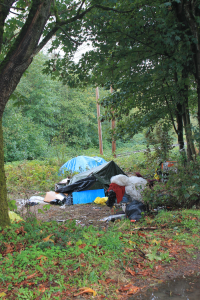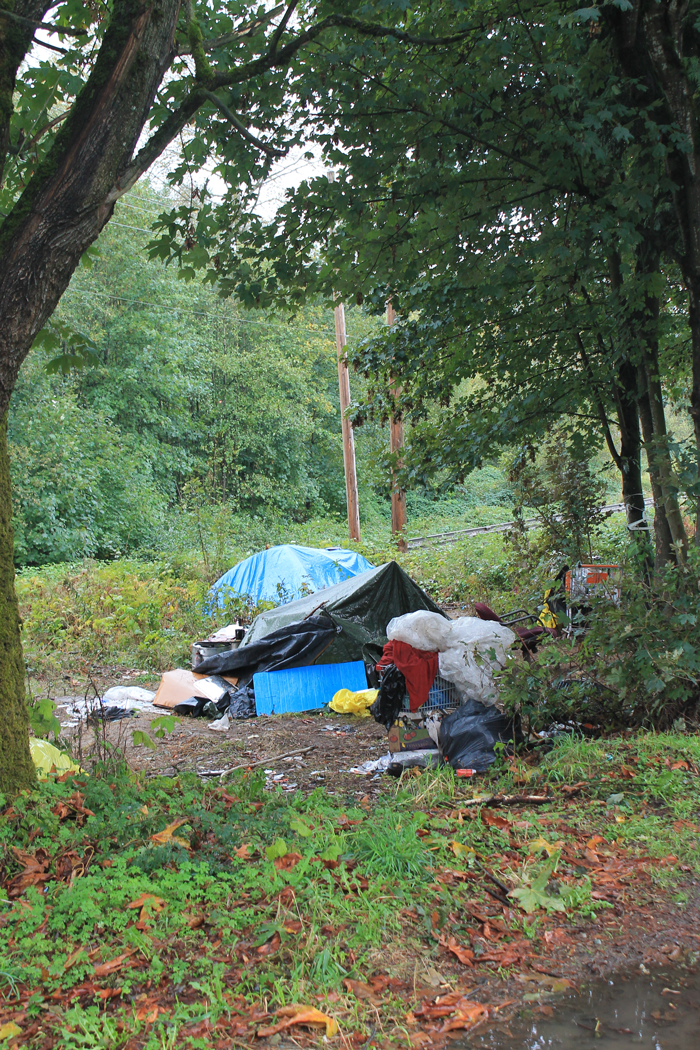By Katherine Gibson (The Cascade) – Email
Print Edition: October 2, 2013

This summer a series of incidents in Abbotsford has brought the issue of homelessness in the city to the forefront.
The first occurred June 4 when chicken manure was dumped at a homeless camp on Gladys Avenue across from Salvation Army, locally known as the Happy Tree camp. The media attention that followed forced the City to publicly address the issue; ultimately it issued a formal apology and accepted full responsibility for the incident. Nevertheless, Abbotsford’s actions raised questions about its treatment of the homeless.
Some residents of the Happy Tree camp filed law suits against the police, citing vandalism of property. The slashing of tents and pepper spraying of personal belongings were the two most prominent complaints.
On September 10 the City issued a formal 48-hour eviction notice to homeless individuals living at another site on Gladys Avenue, where they had relocated after the chicken manure forced them from their original location.
In the end, the homeless camp returned to its spot across from Salvation Army and no one was forcibly removed – homeless individuals were still residing there at press time.
Different camps,
different communities
There are other homeless camps in Abbotsford that have not had as much city attention. One such camp, known by those who live there as Norm’s Camp, is across from the Healthway Market further along Gladys Avenue. Residents have lived there on and off for two years.
One resident of the camp stated that she had been living in the camp for upwards of two years with no issue. She also went on to explain that she remained at Norm’s Camp rather than staying in a homeless shelter because she felt safer being with individuals she knew and lived with on a daily basis.
Beyond this, all of the residents present at Norm’s Camp were adamant that they were in no way associated with the homeless individuals who were camped out at the Happy Tree.
As to whether or not this camp has received any formal notices similar to the ones issued to residents of the Happy Tree, Abbotsford city clerk Bill Flitton did not offer comment at press time.
A history of
homelessness

Homelessness is not a new social issue in Abbotsford. Incidents like those occurring in the past few months have happened before.
Gail Franklin, a previous community liaison for the Fraser Valley Housing Network, remembers a similar situation.
“In 2006, a small group of people who were chronically homeless decided to camp out in a space across from the Abbotsford News [building] on Sumas Highway, up behind the Save-On Foods lot on a piece of unused city land,” she says.
“They set up some tents and called it Compassion Park,” Franklin continues. “Then things really hit the fan. The neighbours became very upset; they thought that a tent city was about to go in there … and that was when the city became very much involved.”
Ultimately the camp was disbanded and over time, Compassion Park and the issue of homelessness faded from people’s minds.
Long-term solutions?
No matter where the homeless choose to stay or how much attention they get, the fact remains that there have been few concrete solutions proposed to aid homeless individuals in Abbotsford in the long term.
Enter Abbotsford Community Services (ACS) and its proposed Supportive Housing Project.
The initiative aims to give men who are homeless or close to homelessness an opportunity to live in an affordable, safe environment off the street. This project is designed to house applicants in an apartment-style building for up to two years.
ACS executive director Rod Santiago notes that the housing unit targets men only because the target client group for the building was defined by BC Housing before ACS applied for funding. As well, the Christine Lamb Residence for women is already established in Abbotsford.
With 24-hour supervision provided by a trained caretaker and access to other social services, ACS hopes building this facility will lead to stronger connections between individuals who are currently homeless and the local Abbotsford community.
Santiago explains the intention of the project.

“The solution in the past has been to push [homeless individuals] off to the next place. But with [this project], there is a chance to actually, on a daily basis, build relationships with these men, make change, and then draw them into the community by building healthy attachments.”
However, due to rezoning issues and the opposition of the Abbotsford Downtown Business Association (ADBA), the realization of this project is uncertain.
“Regardless of where this [building] goes, there’s always going to be people that say, ‘great idea, but wrong place – not here,’” Santiago notes.
While he appreciates the concerns of the ADBA, he feels the benefits of having this facility in Abbotsford overwhelm any opposition or uncertainty.
“The province has already committed $2.6 million to the proposal, and $215,000 a year for 60 years for operations should this initiative go through,” he continues. “If the rezoning process does not go through, Abbotsford does not get to keep that money; the money goes back into the provincial pot and Abbotsford goes to the back of the line. Do we want to let go of $2.6 million because a few people are saying, ‘wrong location?’”
ACS hopes to open the facility by no later than January 2015, a plan still waiting on approval of rezoning by the city.
“It’s about what we can do that will have some sort of long-term solution,” Santiago explains. “This isn’t the answer to everything, but it’s a start.”


